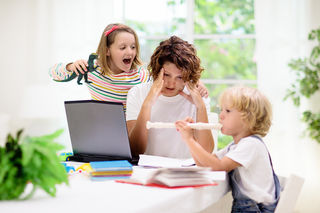Parenting
Can I Be a Good Parent and a Good Professional During COVID-19?
Here’s a tip: Don’t aim for perfection.
Posted April 20, 2020 Reviewed by Jessica Schrader
By Gennifer Lane Briggs, LCSW

Our lives have been turned upside down by COVID-19. We have been thrown into a surreal new world where our personal and professional selves have been combined. Fear, uncertainty, and threats seem to surround every aspect of our lives. For parents with young children, the challenges of maintaining a job while home-schooling them can be overwhelming. At this time, the goal should be “good enough” rather than perfect.
I’m experiencing this firsthand, along with my patients. As a psychoanalytic therapist, I try to keep my private life separate from work with patients. But now, some know I have a dog and a parrot that can sing “Star Wars.” Without the separation of personal and work life I had before, can I remain professional? Am I being the best therapist?
While sometimes I have doubts, I generally think so—because of what we know about good enough parenting and how that actually helps build important skills and strengths in kids.
What Is Good Enough Parenting?
Years ago, a study was done to see what kind of parenting produced the most well-adjusted child. Three groups were studied: One group of children had parenting that would be considered neglectful or even abusive. Another group had parents who were there for their children most of the time, but not always. The final group had parents who tried to attend to their children’s every need with perfect attunement.
Which group tended to raise the healthiest children? The middle one: Parents who got it right most of the time and made mistakes along the way. In other words, the "good enough" parents.
Donald Winnicott, author of the study, defined such a parent as a one who met their children’s physical and emotional needs most of the time. But sometimes, these parents were not attuned to their children. Sometimes they lost their temper. Sometimes they failed to be empathic.
So why did these children grow up more well-adjusted? Because in those moments when their parents missed the mark, the children learned important lessons and skills. They developed frustration tolerance. They developed the ability to calm themselves down. They learned they sometimes had to solve problems on their own.
Don’t Let Perfect Be the Enemy of the “Good Enough”
A good enough parent doesn’t expect perfection of themselves or their children. These parents realize kids will survive making mistakes and become more resilient as a result. Parents make mistakes, apologize for them, and move on.
Today, “helicopter parents” believe they have to monitor a child’s every move, carefully choosing the best activities, and fighting their battles so they won’t be “traumatized.” Unfortunately, children of helicopter parents never learn to fail or how to cope with life’s daily struggles. They may be more likely to quit the first time they face an obstacle.
If you are a perfectionist, you’re making parenting more difficult for yourself and less beneficial for your kids. It might be hard to let go of desires for perfection; you might feel loss or disappointment in yourself or your children. Acknowledging those feelings, while knowing “good enough” is just right for you and your children, can help in dealing with feelings of disappointment or regret.
If you’re worried about your children getting behind in school, remind yourself everyone is in the same boat. They will catch up. Having trouble concentrating at work? Remember this is normal during stressful times. Is your house a mess? Don’t worry, it will eventually be clean again. When we are stressed, it is best to set reasonable expectations. Allowing “good enough” to be enough is the best way to cope until life returns to normal.
An Example:
Maria (not her real name) is a partner at a law firm with two grade-school children. She was remodeling her kitchen when COVID-19 hit. Now she’s struggling to write briefs, cook family meals from a makeshift kitchen in her bedroom, and home school her children.
She told me, “At the end of the day, if I got some work done, fed everyone something, even if it was chicken nuggets and fries for the fourth time this week, and spent some time helping my kids with homework, I consider that day a success.” While this might not look like a typical day in Maria’s pre-pandemic house, given the demands and resources available, everyone’s needs have been met fairly well.
Times are difficult, but they won’t last. Remember:
- Good enough parenting raises healthy children.
- Accept that you don’t have to function at the same level right now, and in fact, that you can’t. Nobody can.
- Assess your children’s personality and where they are developmentally. Think about what they could handle in pre-COVID-19 times. Figure out where they might need the most support – and what would be a good enough way of meeting their needs now.
- Calm your own anxiety and model that for your children. Keep in mind that someday, somehow, things will eventually return to normal.
- Acknowledge the uncertainty and fear we’re all experiencing these days and put your normal expectations on hold. You’ve got a lot on your plate and it’s OK—trying to ignore this could only lead to more stress and anxiety.
- Take a deep breath. Every day you and your children are able to get some work done is a success!
Gennifer Lane Briggs, LCSW, is a psychoanalyst in private practice in Miami, Florida. She has over 25 years' experience working with adults. Gennifer teaches and provides clinical supervision to colleagues. She is a member of the Florida Psychoanalytic Center, American Psychoanalytic Association, and Chinese American Psychoanalytic Alliance (CAPA), where she is also on the Board of Directors, serving as their Secretary.




